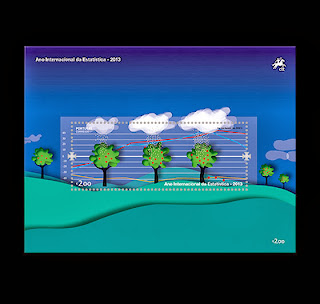The International Year of Statistics
(Statistics2013) is a global initiative, now encompassing more than 1400 participating
organizations from 108 countries, which aims to celebrate and recognize the
powerful contributions of statistical science to the lives of each one of us,
on our everyday chores.
Through the combined effort of many
organizations specializing in this area, the event "Statistics2013"
aims to promote the importance of statistics, not only for the scientific
community in the broad sense, but also for the business community, the
government, the media and the public in general. Updated information throughout
the course of these worldwide and national celebrations can be found in the
sites http://www.statistics2013.org/ and http://www.spestatistica.pt/,
respectively.
The objectives of this comprehensive celebration
are:
- To increase public awareness of Statistics as
a fundamental tool in all aspects of life in society.
- To promote Statistics as a career, especially
among young people.
- To support and encourage creativity and
development in Probability and Statistics sciences. Why this reminder in 2013?
Most likely the joint organization of
prestigious international institutions linked to the area came forward with
this idea for this year because on the same date two important anniversaries
related to this science are celebrated: the 300 years since Jacob Bernoulli’s
publication of the classical work on probability calculations “Ars
Conjectandi”, and the 250th anniversary of the publication of the article by
Thomas Bayes on the famous argument of inverse probability that would be
associated with his name through the designation “Bayes Theorem”, which is the
basis of a strong approach to Inductive Inference called Bayesian Statistics.
Nowadays the notions of Statistics and of (the
Theory of) Probability are well differentiated. In a synthetic form, it can be
said that the Theory of Probability is the study of mathematical models
suitable for the description of random experiments, i.e., involving uncertainty
(the so-called probabilistic or stochastic models). And that Statistics is the
science of collecting, organizing, analysing, interpreting and transmitting
data, i.e. measurements or observations taken from the real world, as well as
the prediction of new data. Thus, Statistic is an area of science, separated
from Mathematics but in many aspects (in obtaining inferences and predictions)
it is based on it and dependent on Computing. Depending on the many different
approaches we may have Descriptive Statistics, Statistical Inference,
Statistical Prediction, Statistical Decision, Official Statistics, Mathematical
Statistics, Computational Statistics, Frequentist Statistics and Bayesian
Statistics.
The implications of Statistics in anyone’s life
are of an extreme extent, given the multiple domains of knowledge where the
ideas and methods developed by this interdisciplinary science spread to.
Take modern governance for starters, dependent
on the definition of social, economic and cultural policies that demand to know
exactly how many we are, how we are and what are the development trends of our
population – issues that Statistics can help clarify. It is correct to say that
without Statistics there is no proper governance! Reflecting on the various fields
of knowledge, one can easily find examples of application of Statistics to
Medicine, Pharmacy (Pharmacology), Epidemiology and Public Health, Biology,
Agronomy, Ecology, Physical and Human Geography (Demography), Chemistry,
Energy, Physics, Engineering (traditional and modern specialties), Economics,
Finance (Actuarial Science), Political Science, Sociology, Psychology, and even
in Law (Forensic Genetics) and Humanities (Quantitative Linguistics and
Literature).
The impact of this branch of knowledge in other
fields of knowledge is such that there are many (some recent, others have
dozens of years) Statistics applications (alone or together with Mathematics
and/or other subjects) among which we name, non-exhaustively: Biostatistics,
Biomedical Statistics, Biometrics, Genetics Statistics, Survival Analysis,
Pharmacometry, Chemometrics, Statistical Physics, Industrial Statistics,
Reliability, Statistical Quality Control, Geostatistics, Environmental
Statistics, Econometrics, Financial Statistics, Sociometry, Statistical Polls,
Psychometrics and Stylometrics.
It is thus virtually impossible to name an
aspect of modern life where statistics, as the science of uncertainty par
excellence, may not be present. Therefore it can also be argued that without
Statistics there is no consistent development. In an increasingly crucial
manner, statistics (now understood as numbers summarizing data) are there to
describe real-world situations and to assist the corresponding decision-making
within contexts of uncertainty.
A full citizenship cannot but require a
consistent combat against statistical illiteracy inside and outside the
traditional educational environments. It is not only up to politicians and
scientists, but also all citizens, to know to look beyond the apparent
strangeness of numbers and find in them – just as Pythagoras - one of the true
beauties of the universe.
Technical Details
Date of Issue: 24 May 2013
Values: stamps of 0,36€ and 1,00€.
Souvenir sheet with stamp of 2,00€.
Acknowledgments: Professor Daniel Paulino, Sociedade
Portuguesa de Estatística
Designer: João Machado
Photos:
Printer: INCM
Process: Offset
Size: stamps: 40,0 x 30,6 mm
Souvenir sheet: 125 x 95 mm
Perforation: Cross of Christ 13 x 13
Paper: FSC 110 g./m2
Watermark:
Sheet: with 50 stamps
























.jpg)












































No comments:
Post a Comment